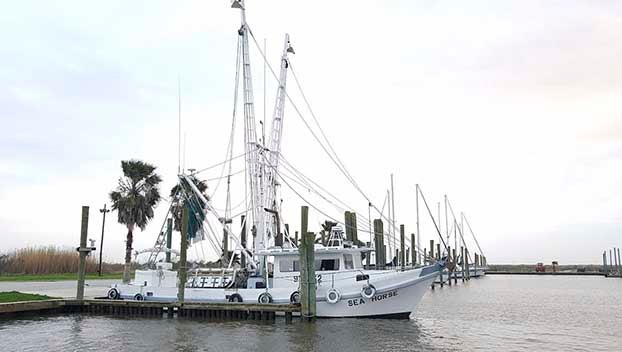MARY MEAUX — Our shrimping industry keeps taking hits with foreign imports
Published 12:36 am Thursday, July 13, 2023

- Kyle Kimball's shrimp boat is seen docked in Sabine Pass. (courtesy photo)
|
Getting your Trinity Audio player ready...
|
Days before the opening of the Gulf of Mexico commercial shrimp season, a group of shrimpers held a rally in Texas City to bring awareness to the plight of Texas shrimpers and the shrimping industry in general.
Tricia Kimball, whose husband Kyle is president of the Port Arthur Area Shrimpers Association, explained the effort.
The season for the Gulf of Mexico state and federal waters reopens 30 minutes after sunset Saturday, according to the Texas Parks and Wildlife Department.
But there may be fewer shrimp boats on the horizon as commercial shrimpers are dealing with higher costs to operate and the blowback from cheap imported shrimp that are flooding the market.
Kyle Kimball is a third generation commercial shrimper. He remembers standing on a 5-gallon bucket as a child helping his father pick through shrimp. It’s been his lifelong career but last year when diesel prices hit $5 per gallon, he only went out once because it was too expensive.
Tricia Kimball said current prices for the shrimp they are catching are about half of what the prices were in the 1980s when adjusted for inflation.
She laid out the industry concerns:
- Sustainability of the shrimp resource
- Industry innovation
- Foreign imports flooding the market that are also using “slave” labor to keep prices down
- Low prices paid to the shrimpers for their product
- Huge price increases in supplies, maintenance and fuel for boats
- Transparency
- Governmental regulations
- Infringing on our historical offshore fishing areas by wind farms like those planned around Galveston into Louisiana
Anti-dumping tariffs
Anti-dumping tariffs are taxes placed on imported goods to make up the difference between the export price and normal value.
China, Thailand, India, Brazil and Vietnam have anti-dumping tariffs in the U.S.
Ecuador, however, does not. Leaders in the shrimping association are looking to speak with lawmakers on this.
According to seafoodsource.com, the U.S. imported 150 million pounds of shrimp in January. And seafoodnews.com said the U.S. was headed toward importing 2 billion pounds — a number that was reported back in 2021.
Tricia Kimball said the imported, foreign shrimp usually contains chemicals or antibiotics that are banned in the U.S., making them hazardous.
“We have way better shrimp,” Kimball said of U.S. shrimp.
Sometimes commercial shrimpers are in a do-or-die situation. They dock their boat at a specific shrimp house and when they return they must sell their product only to that shrimp house. This drives the cost down and the shrimpers end up selling their shrimp for much less than they are worth.
It’s a vicious cycle that needs to be fixed.
One possible way to support U.S. shrimpers is to look for the “wild caught in the USA” logo on store bought shrimp.
Mary Meaux is a news reporter at The Port Arthur News. She can be reached at mary.meaux@panews.com.






